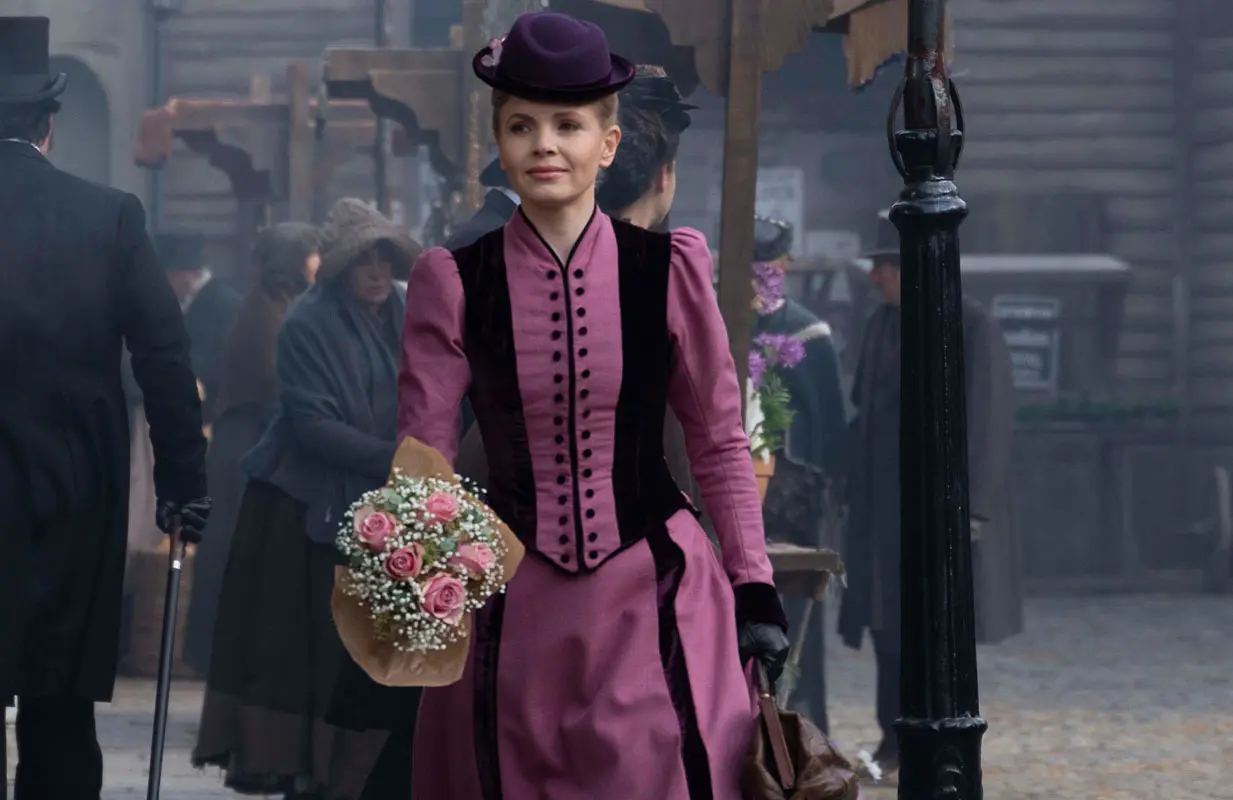Miss Scarlet May Have Lost the Duke, But She's Already Changed the TV Landscape
-
 Kate Phillips as Miss Scarlet, sans the Duke (Photo: PBS)
Kate Phillips as Miss Scarlet, sans the Duke (Photo: PBS)It is a truth acknowledged by TV executives behind closed doors that mysteries are the province of female viewers. This is especially true of the “cozy crime” mystery that dominates British shows that have been the bread and butter of PBS’s Masterpiece for decades, and now drive niche streaming services like BritBox and Acorn TV. The irony, of course, is that most of these shows have been traditionally written by, and star, men. It’s only in the last decade or two that female detectives have become ubiquitous, and even more recently that it’s been true of period mysteries.
But with Miss Scarlet and The Duke, PBS seemed to find a formula that hit every button at once, spawning a trend that’s now being imitated across the streaming landscape. Like all good trendsetters forging paths for others to follow, Miss Scarlet and The Duke had to keep ahead of everyone else. Now, just as the rest of the world is catching up, Miss Scarlett’s lost the Duke, and is going solo.
PBS’s Sunday nights were already known for detective mysteries, female-fronted series, and Victorian-set period dramas. Shows like Unforgotten found devoted audiences by mixing two of those together; Sherlock Holmes always works because it is two of those in a nutshell; and while series like Victoria never managed to find the heights of Downton Abbey, you can’t get a more female-fronted Victorian drama that a show about the queen who gave the period its name.
However, a show that checked all three boxes was something new, and the fact that it worked was something of a surprise. When it debuted, Miss Scarlet and The Duke wasn’t just a female-fronted detective drama set in the Victorian era. It was a will-they/won’t-they romance between Miss Scarlet (Kate Phillips), a woman who wanted her independence and a career as a detective, and Detective William “The Duke” Wallace (Stuart Martin), her working-class male best friend, who loved her for it but also couldn’t imagine a wife that wasn’t his property. It was a story about those finding their way in a world that was hostile to anyone who was not a white middle-class man with a posh English accent, about class expectations. Miss Scarlet and The Duke examined privilege, who has it, who doesn't, and how much you can get away with by having friends in the right places.
Sometimes it was so focused on these other elements that the mysteries became a total afterthought; some mysteries weren’t even really mysteries at all. And yet audiences were rabid for Rachael New's period crime drama. The Scarleteers, a devoted fangroup, sprang up. Masterpiece found the audience so receptive, it did something extraordinarily rare for public television, releasing Season 3 early for members on PBS Passport directly following Season 2’s conclusion, instead of waiting for the linear airing months later. (The signup boost was not insignificant.)
But the true measure of success in television is no longer the size of your audience or how many people donate to your local station to access your membership streaming benefit. It’s in how many streaming services start making versions of your show for their own platforms. Since its March 2020 debut, Miss Scarlet and the Duke has inspired the creation of a number of shows trying to mix those elements together in different proportions, and with different results.
There’s The Artful Dodger, an Australian-based series on Hulu, which is a mystery series that’s also a medical drama, nominally an Oliver Twist spin-off, but that last part is there to give it a recognizable IP to hang off more than Victorian credentials. There’s the Tudor-set detective series Shardlake, based on the novels by CJ Sansom, coming to Disney+, which is “What if Wolf Hall, but a detective series?” Those unfortunately star men, but they have all the other elements of Miss Scarlet and the Duke, including the romance, the mashup of genres, and the mysteries only being one reason out of many to tune in.
Meanwhile, Netflix tried The Irregulars, which was a Sherlock-based Victorian detective series about a teenage girl detective and her titled teenage boy love interest. Sadly, it didn’t last; it was soon supplanted by Enola Holmes, which is basically the same thing, but a film franchise starring Millie Bobby Brown, complete with a different titled teenage boy love interest. Masterpiece aired the cross-genre, cross-time-period, deeply meta, female-fronted Magpie Murders, to be followed up this year by Moonflower Murders. BritBox successfully spun off Father Brown into Sister Boniface Mysteries, a period-set series about a Vespa-riding nun who solves crime, saves souls, and questions women's place in the church while she’s at it.
So, what is a trendsetter like Miss Scarlet and the Duke to do when the world seems to be hellbent on following in its footsteps? Apparently, the answer is to make a sharp left and walk in an entirely different direction. The announcement that Season 5 will drop the Duke from the series wholesale (including and the Duke from the show’s title) was a shock to fans of the show and TV critics alike. It’s a bold move, one that could very well backfire. But for a show that’s already changed the television landscape once in the 2020s, it’s really just par for the course. All in a day’s work for Miss Scarlet.
Ani Bundel is an entertainment writer covering everything from celebrities to movies to peak TV when she's not tweeting or Instagramming photos of her very fuzzy cats. Her other regular bylines can be found at PBS/WETA's Telly Visions, where she co-hosts a weekly podcast by anglophiles for anglophiles, CNN Opinions, and MSNBC Daily.
TOPICS: Miss Scarlet and The Duke, PBS, Magpie Murders, Miss Scarlet, Moonflower Murders, Kate Phillips, Stuart Martin